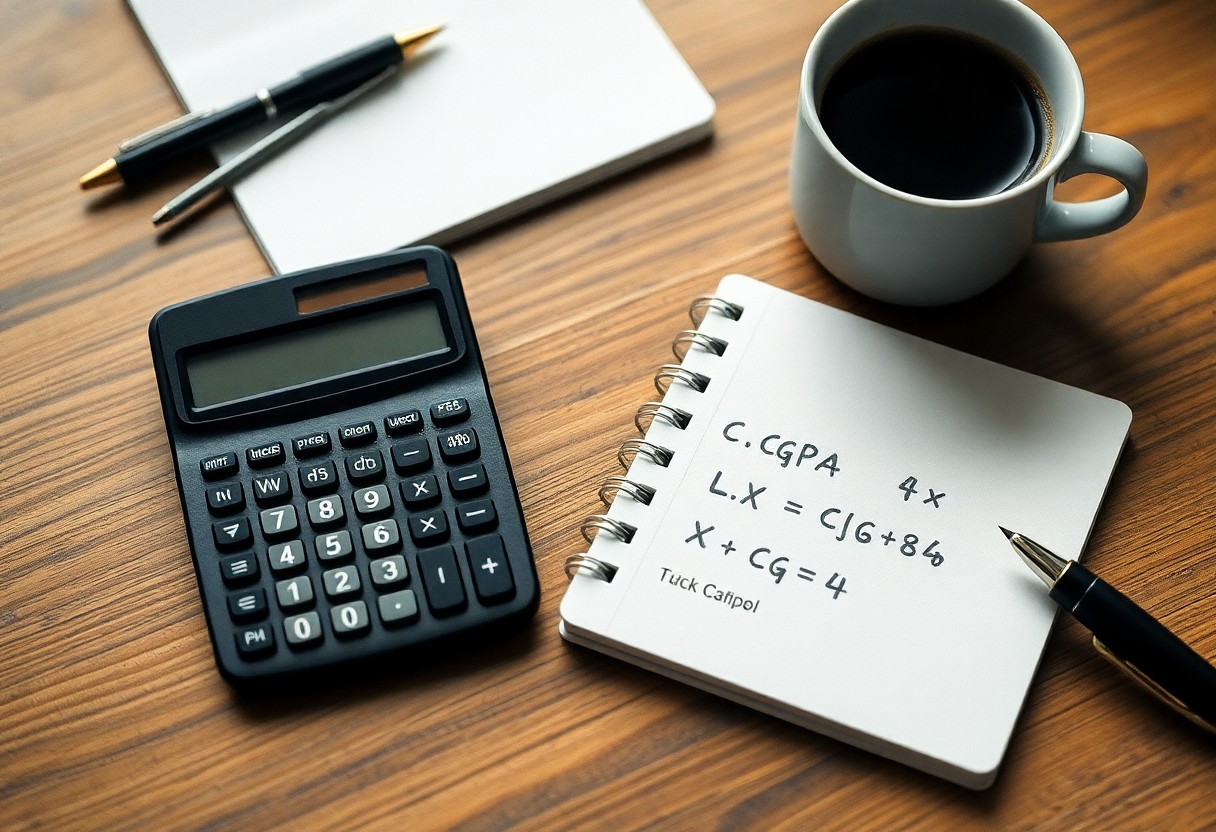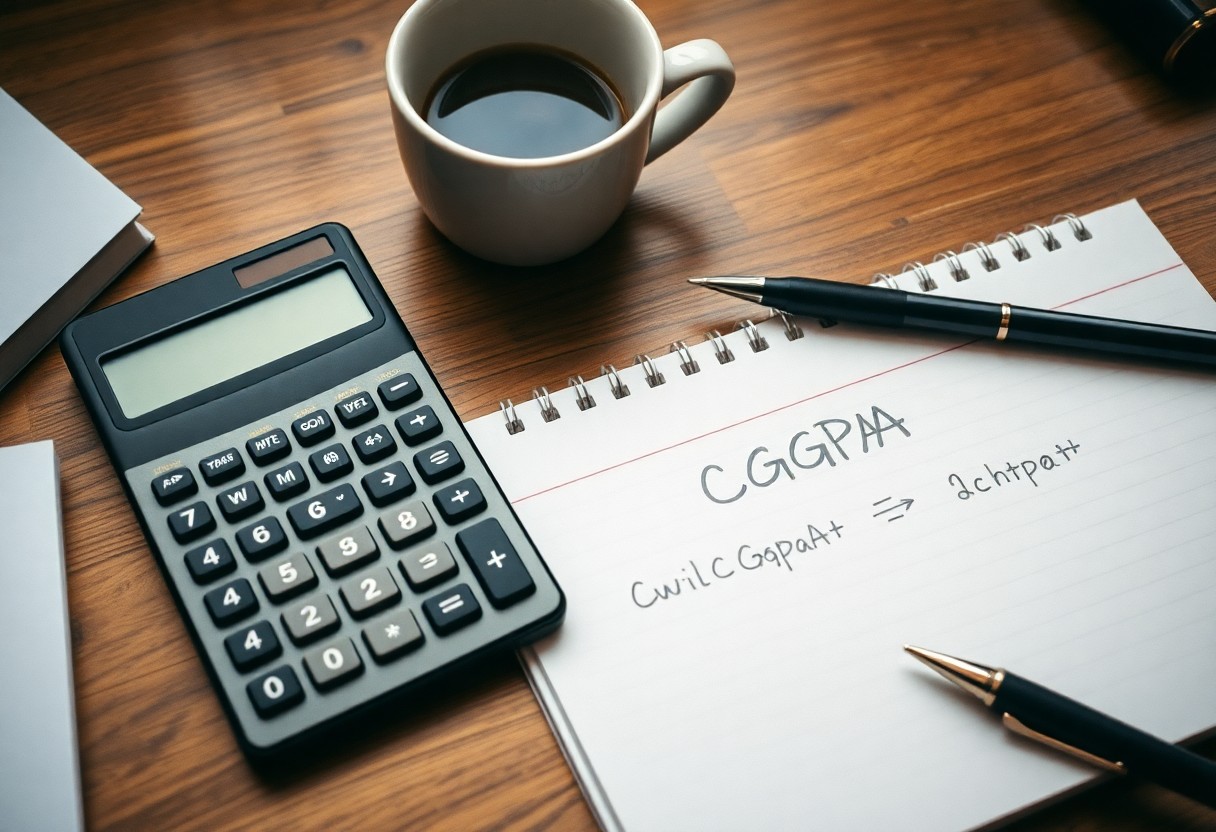This guide will help you effectively convert your percentage into CGPA, ensuring you understand the simple calculation involved. By knowing how to perform this conversion, you can accurately represent your academic performance, allowing for better comparisons and evaluations during further studies or job applications. Follow the steps below to easily transition from percentage to CGPA, that way you can effectively assess your academic standing without confusion. Let’s get started!
Table of Contents
Key Takeaways:
- Understand the Scale: Familiarize yourself with the specific CGPA scale used by your institution, as it may differ in maximum and minimum values.
- Use the Formula: The general formula to convert percentage to CGPA is: CGPA = (Percentage / 100) * Maximum CGPA. Replace the Maximum CGPA with your institution’s value.
- Check for Weightage: Some institutions may consider different weightage for different subjects, so ensure you account for this in your calculations.
Understanding CGPA
Before delving into the conversion process, it is vital for you to grasp the concept of CGPA. The Cumulative Grade Point Average (CGPA) is a standardized system that reflects your academic performance throughout a specific period, typically in a semester or year. It serves as a valuable metric for evaluating your overall achievements and allows educational institutions to maintain consistent assessment criteria.
Definition of CGPA
Some may define CGPA as a numeric representation of your average performance across various courses. It is calculated on a scale—commonly out of 10 or 4—summarizing your grades into a single score that holds significant weight in academic assessments.
Importance of CGPA in Academics
CGPA plays a vital role in your academic journey. It affects your eligibility for scholarships, internships, and further studies. A high CGPA not only enhances your resume but also sets you apart in competitive environments.
Understanding your CGPA’s significance can lead to better academic choices and strategies. A higher CGPA may open doors to premium job opportunities and better educational prospects. Additionally, schools and colleges often utilize CGPA as a basis for admission into higher tiers of education. Therefore, maintaining a strong CGPA is an aspect you should prioritize, as it can profoundly impact your future career path and academic aspirations.
Conversion Formula for Percentage to CGPA
Some universities and institutions have established specific formulas to convert percentage scores into Cumulative Grade Points Average (CGPA). Typically, the most common method is to divide your percentage by 9.5, which allows you to get a corresponding CGPA on a scale, usually ranging from 0 to 10. This formula is widely accepted, but slight variations can exist, which is why you should always verify your institution’s requirements to ensure accurate conversion.
Standard Conversion Methods
Assuming you are following the standard conversion method, the formula is straightforward. For instance, to convert a percentage of 75%, you divide 75 by 9.5, resulting in approximately 7.89 CGPA. This method is widely adopted and helps streamline your academic evaluations. Always double-check with your institution to confirm this method aligns with their guidelines.
Variations in Conversion Based on Institutions
Some universities implement different conversion systems or scales. Each academic institution may have its unique way of calculating CGPA from percentage marks, which can influence your overall academic standing. Always consult your institution’s specific guidelines or academic handbook for the correct conversion method to avoid any discrepancies in your academic records.
To ensure you are using the correct conversion approach, check with your institution regarding their specific formula. Depending on their grading policies, the conversion may not be as straightforward. Adjustments may apply, such as different scaling factors that affect how your grades translate, potentially resulting in higher or lower CGPA than expected. Thus, staying informed about your institution’s practices ensures that your academic achievements are accurately represented.

Step-by-Step Guide on Conversion
Keep this simple guide handy as you navigate through the conversion of percentage into CGPA. Follow these steps methodically to ensure accuracy:
| Step | Action |
| 1 | Collect your percentage grades |
| 2 | Identify the conversion scale |
| 3 | Perform the calculation |
Collecting Required Data
One of the first steps you need to take is to gather all your percentage grades from each subject. Organize them in a clear list to ensure you have the right data at hand for conversion.
Performing the Calculation
Even after you have your data ready, it’s important to follow the specified formula closely. Generally, the CGPA is calculated by dividing your total percentage by the maximum possible percentage and then multiplying by a standard scale.
Calculation of your CGPA involves using the formula: CGPA = (Total Marks Obtained / Maximum Marks) x 10. Ensure you sum up all your percentages accurately. This straightforward process allows you to convert your performance effectively. The most important part is to keep track of the maximum marks of your respective courses, as any discrepancies here might lead to a dangerous miscalculation of your final CGPA. Once you have calculated your CGPA, you can use it to assess your academic standing positively.
Tips for Accurate Conversion
Not all conversion methods yield the same results, so it’s necessary to follow certain guidelines for accurate conversion. Consider these tips:
- Use a reliable formula tailored to your institution’s grading scale.
- Keep track of rounding rules to maintain consistency.
- Utilize online calculators for additional verification.
- Consult your academic advisor for insights on conversion standards.
Perceiving accuracy in your calculations can greatly impact your academic performance.
Avoiding Common Mistakes
There’s a myriad of pitfalls when converting percentage to CGPA. Misunderstanding your institution’s grading criteria or applying the wrong formula can lead to incorrect results. Additionally, be cautious about rounding off too early in your calculations, as this may skew your final CGPA. Paying close attention to detail helps you avoid these common errors.
Double-Checking Your Work
Tips suggest that you should never skip the double-checking process. By meticulously reviewing your calculations, you can identify any discrepancies or errors that may have occurred initially. Work through your conversion step-by-step, validating every part of the process. Since grades can greatly affect your future, it’s important to be positive that your final CGPA representation is accurate. Make sure to have a peer or mentor check your work as well, adding another layer of verification.
Factors Influencing CGPA Calculations
Many factors influence CGPA calculations, which can impact your overall academic performance. Some of the main considerations include:
- Grading Scale
- Credit Hours
- Course Difficulty
- Weightage of Subjects
Knowing these aspects can help you understand how your CGPA is determined and guide you in making informed academic choices.
Grading Systems
You should be aware that different institutions may utilize varying grading systems, affecting how your grades translate into CGPA. Some systems employ a standard letter grade method, while others utilize numerical scales. Understanding your school’s grading system is imperative for converting your percentage to CGPA accurately.
Weightage of Subjects
Factors affecting CGPA calculations also include the weightage of subjects. Each course may have a different significance in your overall CGPA based on its credit hours and difficulty level.
For instance, a major course in your program may carry a higher weightage than an elective, impacting your CGPA more significantly. If you excel in subjects with a higher weightage, it can substantially boost your CGPA. Moreover, subjects often have varying difficulties which can affect your grades; hence, performing well in these critical courses is beneficial for your overall performance and future opportunities.

Tools and Resources for Conversion
After you’ve decided to convert your percentage into CGPA, utilizing the right tools and resources can streamline the process. You can take advantage of various online calculators and university guidelines that provide a reliable framework for conversion. Ensuring accuracy in your calculations is vital, as it directly impacts your academic assessments.
Online CGPA Calculators
Assuming you want a quick conversion, online CGPA calculators are user-friendly resources available on multiple educational websites. Just enter your percentage scores, and they will calculate your CGPA in seconds. These tools often provide instant results, helping you track your academic progress effortlessly.
University Guidelines
Now, you should familiarize yourself with your university’s guidelines on CGPA conversion, as these can vary significantly between institutions. Each university typically has a specific formula for translating your percentage into CGPA based on their unique grading system.
CGPA calculations may incorporate weighted averages, different grading scales, and subject-specific considerations, which can lead to varying outcomes. Different universities can have specific benchmarks that determine how your percentage translates into CGPA. Thus, consulting your university’s academic handbook or website for these official guidelines is vital to ensure you have accurate information tailored to your institution’s grading policies.
To wrap up
Following this guide will simplify the process of converting your percentage into CGPA. By understanding the specific formula relevant to your grading system, you can effortlessly calculate your CGPA from your percentage score. For additional assistance, you can check out resources that provide detailed steps and tools to Convert Percentage to 4 and 10 Points Grade. With these insights, you will be well-equipped to accurately assess your academic performance.
FAQ
Q: How do I convert my percentage into CGPA?
A: To convert your percentage into CGPA, you can use the formula: CGPA = (Your Percentage/10). This means if you received an 80% score, your CGPA would be 8.0. It’s important to ensure that you are using the correct grading scale as different institutions might have different guidelines for conversion.
Q: Is the conversion formula the same for all educational institutions?
A: No, the conversion formula can vary between different educational institutions. Some universities may have their own specific formulas or grading systems. It’s best to check with your school or university’s academic guidelines to find out the exact formula they use for converting percentage into CGPA.
Q: What should I do if my institution uses a different grading scale?
A: If your institution employs a different grading scale, consult your school’s academic resources or administrative office for their specific conversion method. Some institutions may provide a chart or a detailed formula that outlines how percentages translate into CGPA within their system. Following their guidelines will help ensure accurate conversion.